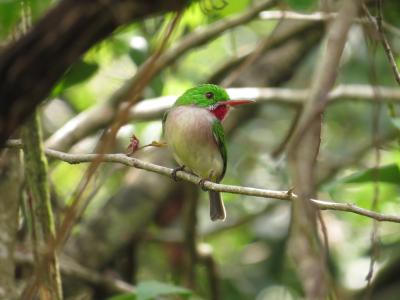Georgia in Autumn
Migration Along the Black Sea
-
Sep 14-24, 2026
Rob Sheldon
Tour Price to be Determined
Tour Price to be Determined
Georgia rewards its visitors with breathtaking scenery, a rich history, and stunning architecture. For the birdwatcher, a migration corridor with more than a million southbound birds of prey and other species, a number of Caucasian mountain endemics, and an abundance of forest, wetland and grassland birds is similarly alluring. Intertwining these two aspects with marvelous local cuisine and famous Georgian wine will make for a memorable tour.
Day 1: The tour begins this evening with a brief introductory meeting at our Tbilisi hotel, followed by an evening stroll around the historical part of the capital city, and ends with a hearty Georgian dinner, accompanied by our first taste of Georgia’s famous local wine. Night in Tbilisi.
Day 2: We’ll begin in the Tbilisi, familiarizing ourselves with typical resident and transient birds. We’ll visit the Ponichala Reserve and woodlands near Tbilisi, aiming to see five species of woodpecker: Syrian, Middle-spotted, Lesser-spotted, Green, and Black. We can also expect a variety of passerines including migrating warblers and species such Red-breasted Flycatcher. Night in Tbilisi.
Days 3-6: After yesterday’s gentle introduction, we’ll head towards the city of Batumi, a port town nestled in the highly scenic southwest corner of the country, between the Black Sea and the Lesser Caucasus. We’ll bird along the way and include a stop at Svetitskhoveli Cathedral in Mtskheta Town.
Every autumn along this narrow coastal strip over one million raptors and multitudes of other migrants, including thousands of Eurasian Bee-eaters, funnel through on their annual migration from the vast forests and steppes of Eurasia to their wintering grounds in Africa. Our tour is timed to coincide with the main migration period of Steppe Buzzard and we’ll spend time at one or both of the dedicated raptor monitoring stations. Lesser Spotted, Greater Spotted, Short-toed and Booted Eagles, Black Kite, Honey Buzzard, Marsh, Pallid and Montagu’s Harriers and the occasional Crested Honey Buzzard form a worthy supporting cast.
On one day, we’ll explore the Chorokhi Delta to the south of Batumi, an area of coastal scrub and marsh that is a haven for migrants. On the small estuary we hope to find Broad-billed and perhaps Terek Sandpipers, while White-winged Black, Whiskered, Little, Caspian and Gull-billed Terns compete for our attention with a swarm of roosting Yellow-legged and Caspian Gulls. The estuary marshes could hold Spotted, Little and Baillon’s Crakes, “Grey-headed” Purple Swamphen, and a selection of warblers while the nearby scrublands should be full of eastern migrants such as Red-backed Shrike, Barred, Savi’s, and River Warblers, Isabelline and Northern Wheatears, Siberian Stonechat, Thrush Nightingale, Hoopoe, Short-toed Lark, Turtle Dove, and European Roller, among many others.
Georgia is believed to be the oldest wine-producing region in the world, and we’ll be sure to take time to sample the local vintages. On one evening, we’ll stop at a winery nestled in the mountains of a nearby village for a special dinner and wine tasting. Nights in Batumi.
Days 7-8: Leaving the Batumi area, we’ll drive north to the Greater Caucasus to search for Caucasian endemics, including Caucasian Snowcock and Caucasian Black Grouse. En route we’ll stop at Maltakva Beach and search for migrant shorebirds and other species we may have missed at Chorokhi Delta. Once in the Greater Caucasus, we’ll transfer to four-wheel drive vehicles so we can reach the high-altitude birds such as Great Rosefinch, Red-fronted Serin, Guldenstadt’s Redstart, Alpine Accentor, Lammergeier, Golden Eagle, Green Warbler and Mountain Chiffchaff. We’ll also explore lower altitude ridges and pine forests where we could see Kruper’s Nuthatch, Great-spotted Woodpecker, Crossbills and a sub-species of Caucasian Dunnock, a possible future spilt. We’ll also make sure to explore the pleasantly chaotic Mengrelian Bazaar in Zugdidi! Nights in Mestia.
Day 9: Today is mostly travel. We’ll take time this morning to clean up any species we may have missed the previous day before heading back to Tbilisi, with birding stops along the way. We’ll also break up the drive with a stop to explore Uplistsikhe, the incredible cave city that originates from the 6th century BC. Night in Tbilisi.
Day 10: After breakfast, we’ll visit David Gareji, a famous rock-hewn 1500 year old monastery on the border with neighboring Azerbaijan. The area is also good for birds, and we’ll look for a final set of new species including Western Rock Nuthatch, Griffon and Cinerous Vultures, Long-legged Buzzard, and possibly the impressive Imperial Eagle. A good variety of wheatears have been recorded in the surrounding habitat including Black-eared, Pied, Finsch’s, and Isabelline. Afterwards, we’ll enjoy a final sampling of local Georgian wines.
Early afternoon, on the way back to Tbilisi, there will be time for final birding targeting any species we may have missed. There will as well be free time to explore the Tbilisi Old Town, and a sumptuous Georgian feast will bring this amazing tour to a close. Night in Tbilisi.
Day 11: The tour ends this morning after breakfast.
Note: The information presented here is an abbreviated version of our formal General Information for this tour. Its purpose is solely to give readers a sense of what might be involved if they take this tour. Although we do our best to make sure what follows here is completely accurate, it should not be used as a replacement for the formal document which will be sent to all tour registrants, and whose contents supersedes any information contained here.
ENTERING GEORGIA: U.S., U.K., and Canadian citizens need a passport valid for the duration of your stay and containing at least on blank page. A visa is not required for stays of less than 365 days.
Citizens of other countries may need a visa and should check their Georgian embassy.
COUNTRY INFORMATION: You can review the U.S. Department of State Country Specific Travel Information here: https://travel.state.gov/content/travel.html. Review foreign travel advice from the UK government here: https://www.gov.uk/foreign-travel-advice and travel advice and advisories from the Government of Canada here: https://travel.gc.ca/travelling/advisories.
PACE OF TOUR: This tour will require some physical effort as the raptor count stations require a short but steep uphill climb along a dirt track and steps. The other birding areas around Batumi are all at sea level and are on grassy or uneven ground. In the mountains, some uphill walking may be required but generally we will not be venturing far from the road. None of the walks are in any way dangerous but some participants might find a lightweight metal walking pole useful.
HEALTH: The Centers for Disease Control and Prevention (CDC) recommends that all travelers be up to date on routine vaccinations. These include measles-mumps-rubella (MMR) vaccine, diphtheria-tetanus-pertussis vaccine, varicella (chickenpox) vaccine, polio vaccine, and your yearly flu shot.
They further recommend that most travelers have protection against Hepatitis A and Typhoid. Please contact your doctor well in advance of your tour’s departure as some medications must be initiated weeks before the period of possible exposure.
The most current information about travelers’ health recommendations for Georgia can be found on the CDC’s Travel Health website at http://wwwnc.cdc.gov/travel/destinations/traveler/none/georgia.
Miscellaneous: Tap water is basically safe to drink but to be safe drink bottled water, which along with soft drinks and beer, is widely available. Upset stomachs are possible in Georgia, although unlikely. We suggest bringing anti-diarrhea medicine such as Imodium or Arret. Make sure you bring a good sun-screen and also sunglasses to protect you not only from the sun but also from possible snow glare.
Please be sure to bring adequate supplies of all personal medication as it may be impossible to obtain them during the tour.
Smoking: Smoking is prohibited in the vehicles or when the group is gathered for meals, checklists, etc. If you are sharing a room with a nonsmoker, please do not smoke in the room. If you smoke in the field, do so well away and downwind from the group. If any location where the group is gathered has a stricter policy than the WINGS policy, that stricter policy will prevail.
Note: Smoking is an extremely common habit in Georgia and we are sure to find ourselves on some occasions in the presence of local people who will be smoking.
ACCOMMODATION: We will be staying in modern hotels at all sites. Each room has its own bathroom.
CLIMATE: We may experience a wide range of conditions on this tour. The significant part of the tour is spent at Batumi on the Black Sea coast. Here we can expect warm temperatures, but possibly some rain and high humidity at times, so you need to take suitable clothing such as waterproof jackets as well as light summer clothes. When we leave Batumi we travel into the Greater Caucasus Mountains in the Northwest of Georgia and may experience weather typical of higher altitudes, including rain, low clouds and lower temperatures. Sunny and warm days are also perfectly possible! The temperatures around Tbilisi, Mtskheta and Gori are usually dry and mild in September, however a slight wind is always a possibility around David Gareji Monastery due to the typical open, rolling steppe landscapes.
FOOD: The food of Georgia is a delicious blend of Middle Eastern and Mediterranean influences, known for its flavourful dishes and, and although meat does feature in most main meals, these are usually served with a variety of vegetable dishes. Despite the modest size of the country, each region visited during this tour will feature one or a whole selection of special, popular dishes, sometimes cooked nowhere else but only in that particular village.
Drinks: Bottled water a soft drink, a beer or (excellent) Georgian wine is provided at lunch and dinner, as is coffee or tea. In addition, we keep a supply of bottled water on the tour vehicles. All other drinks are the responsibility of the individual.
Food Allergies/Requirements: We cannot guarantee that all food allergies can be accommodated at every destination. Participants with significant food allergies or special dietary requirements should bring appropriate foods with them for those times when their needs cannot be met. Announced meal times are always approximate depending on how the day unfolds. Participants who need to eat according to a fixed schedule should bring supplemental food. Please contact the WINGS office if you have any questions.
TRANSPORT: Transportation is in a minibus and four-wheel drive vehicles. There are a few long drives but these are broken by many stops for birdwatching. Participants should be able to ride in any seat in tour vehicles.
Maximum group size 10 with one leader and a local guide.
























